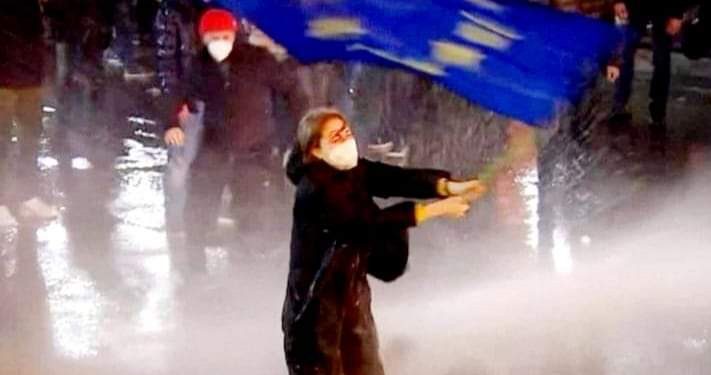The world’s media has echoed last night’s developments in Tbilisi.
Reuters wrote of the police in the center of the capital Tbilisi using a water cannon and tear gas in attempt to disperse the thousands of demonstrators who fear the draft law could hurt the South Caucasus country’s hopes of European Union membership.
“Georgia’s government has in recent years faced criticism from observers, who say the country is drifting towards authoritarianism. In June, the EU declined to grant Georgia candidate status alongside Moldova and Ukraine, citing stalled political and judicial reforms,” Reuters reports.
The BBC spoke of protesters clashing with police in Georgia’s capital, Tbilisi, “after parliament backed a controversial draft law which critics say limits press freedom and suppresses civil society.”
“Riot police used water cannon and pepper spray to disperse the crowds outside the parliament building. Some protesters were seen falling on the ground and coughing, while others waved EU and Georgian flags,” the BBC wrote.
“What most protesters and the country’s opposition fear is that the adoption of the law would mark an end to Georgia’s long-standing ambition to join the EU. More than 80% of Georgia’s population supports Georgia’s European perspective, which is also enshrined in the country’s constitution,” the BBC reports.
The Guardian noted that some of the protesters gathered outside the Parliament building carried Georgian, EU and US flags, and shouted: “No to the Russian law,” and “You are Russian” at politicians inside the legislature.
“Russia is viewed as an enemy by many Georgians, after Moscow backed separatists in the breakaway Georgian regions of Abkhazia and South Ossetia in the 1990s. Hundreds of thousands of Georgians remain internally displaced within the country after several bouts of bloody ethnic conflict”.
“Georgian authorities are backing a ‘foreign agent’ bill despite criticism from Brussels and Washington. The bill is widely seen as emulating a repressive Russian law that allows the Kremlin to crush its critics, Deutche Welle reported.
“The rising anti-Western narratives promulgated by the Georgian government and its refusal to join international sanctions against Russia after the invasion of Ukraine give the impression that Georgia is drifting into the Russian orbit”.














